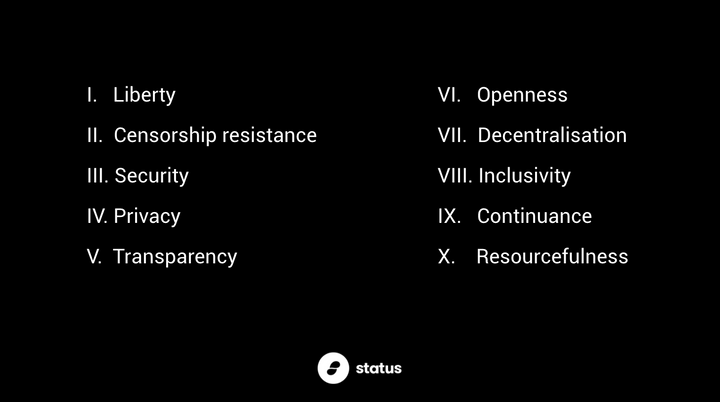In the eleventh session of this 12 part series, join status' core contributors as we discuss and debate to which degree we uphold our principles, how we can improve our performance, and what we're adding to our Wall of Shame.
Liberty:
We believe in the sovereignty of individuals. As a platform that stands for the cause of personal liberty, we aim to maximize social, political, and economic freedoms. This includes being coercion-resistant.
Slide Deck:
Seminar Opening presentation
Seminar Index
Liberty Session Notes (reprinted below)
Youtube:
Wall of shame
- (Ensuring people have right tools for skill set and culture to build and say what they want. Important to honor where people are at culturally at in world, what conditions, resources etc have. Give good understanding for scaling so everyone can really use them.) - we haven't taken into account different cultural perspectives in shaping these tools. E.g how often test in Iraq/Gaza/Mogdasihu/etc.
- Studio, people should be able to choose various frameworks, embark etc, non-partisan platform, give people as much liberty as possible. Aspirational not to get on wall of shame
- Violation would be to let oppressive regime to use Status to compromise liberty for other people
- Security testfairy could've allowed someone's property to be stolen.
- Don't have mechanisms to carry it out, how do we even know if we maximize these freedoms? Mention coercion resistance but don't know if we tested this. A lot to do to validate these things, to make sure living not just saying it.
- Lack of open protocol, hidden inside application, want ecosystem to use protocol to build something bigger.
- Need for instructions on how to use Status Network protocol outside Status app
- Economic freedom: crypto technically complex, more difficult to use crypto, not providing that economic freedom to people.
- Being open system: with ENS we initially we had only stateofus.eth addresses, now any .eth will resolve. That is important, not trying to limit user behavior.
- Plausible deniability we should have, in general. Only free to use Status in some places if we have this
- Economic liberty may not be there with employee model, with DAO more flexible contribution, right now monthly retainer, can go further
We (as in the crypto community) haven't delivered on our promise for increasing personal liberty and enabling economic freedom, let alone at any form of scale.
- From Vitalik tweet storm Dec 2017
- THE SOVEREIGN INDIVIDUAL: MASTERING THE TRANSITION TO THE INFORMATION AGE ebook
- How many unbanked people have we banked?
- How much censorship-resistant commerce for the common people have we -enabled?
- How many Venezuelans have actually been protected by us from hyperinflation?
- How much actual usage of micropayment channels is there actually in reality?
- How many dapps have we created that have substantial usage? Low added value per user for using a blockchain is fine, but then you have to make up for it in volume.
Notes
[Michael]
Let's talk about tools for culture/skillset. What do people think we can do as action points around points 1 and 2 in the WoS to combat this lack of liberty?
[Chad]
We've had an influx of Chinese users. Interesting. May have come due to censorship/political reasons, we may be promoting liberty without understanding the full details. Interesting to explore, figure out how we can help this group.
[Michael]
How to provide support? more multilingual users/ambassadors?
[Shawn]
Right now, we do have communities based around languages. Eduardo and Jinho raised that even around content, it's very EN focused. We should try more actively to create educational content that's localised. Educate on values, ecosystem, etc. As we create content around some of our values, this will be powerful to translate. Iran is an example of a community with censorship e.g. in Telegram, there's a lot to do there. Enabling through content is important. Advocacy Program will disseminate the message, but education and content will go a long way.
[Michael]
How many languages are we supporting on the website?
[Shawn]
KR, ES, CN
[Michael]
Action items
- Basic global perspective with languages available.
- Technical docs / contributor docs translated.
- Create working group in Prague with timeline/action plan
[Chad]
Using service called localise is pretty streamlined. Have intuitive UI, with community members contributing translations. There is a paid version, with community verification.
[Michael]
Let's talk Testfairy - the ability for property to be stolen. What's our plan to mitigate?
[Igor]
Postmortem tomorrow [19 Oct], encourage everyone to join that discussion.
[Michael]
Lack of an open protocol. Using Status network protocol outside of Status app.
[Igor]
Whisper as a baseline, then code that uses Whisper in a certain way to make messages etc. This isn't really an open protocol, you can't go somewhere and read a full specification and make your own implementation of it. We have this knowledge and it's hidden. It's closed right now. We are slightly ahead of Whatsapp in that regard, but still not ideal.
[Oskar]
Let's talk about cultural aspects. Ned raised a good point - in terms of unbanked people, we have the use case of Status teller network, we have expensive/modern devices. How do we reach people without these devices and provide utility for them?
[Ned]
We have connections to these communities through Incubate. We should go there with tools we have and see how they're used, and see what comes together. Even with hardware. If you don't have a connection, would a small mesh network or light client work. See what devices are being used, and what would be important in the UI for these people. Everyone has so many different use cases for the product, but until we go to these places and find the audience, it would be helpful rather than projecting what we think. Need to test it for ourselves versus assuming.
Another thing we were chatting around - in place of a Hackathon, we could create a crypto flea market, to apply a real world situation. Test with real goods, and see how we interact with one another selling common things that aren't digital assets. See what learnings come from that, and apply that to a real market situation. Get answers to inform trading and make it simpler.
[Chad]
This company flew their team into Kenya, did field notes, used mobile money. This case study was really interesting, would love to see Status do something like this.
[Igor]
Should test how things work without internet connection. Areas have no mobile internet, no broadband internet.
[Barry]
The Status protocol itself being a coordination protocol for other protocols or other things. One thing that works well in Status is just sending tokens/ETH in a conversation. That same UX can be applied to coordination in multisig transactions/voting. You could see Status playing a role in coordinating functions and protocols for centralised orgs trying to decentralise. Could have value for other DAO aspiring orgs.
[Oskar]
In terms of us reaching mass adoption - 1) crypto community, 2) markets that need censorship resistant tools. Could onboard entire crypto community. Get an understanding of it by using crypto and trying to use it in day to day life, e.g. buying things, taxation, etc. We could make an amazing experience there, we're making something for ourselves, and we know people we're making it for in the larger crypto community. These ways of transferring value will be important for many companies in the long term.
[Barry]
Having coordination tools and more and more data move to a universally shared ledger between orgs, enables reducing commerce frictions that are inadvertent. Not malicious blockers, but e.g. between large MNCs, coordinating supply chain between each other is complex as everyone has own closed database. Companies spend billions of dollars a year around coordination issues. If this takes off, will this enable a new group of small individuals to enter the market, this could enable economic freedom that's hard to get organically today. The road to coordinating all of this hasn't been deployed.
[Oskar]
See Nick Szabo's essay about multinational small businesses and where we're heading in terms of language and legal. Interaction with legal frameworks, etc.
[Barry]
Seems like it's outside the core focus of Status right now, there may be some people working on it in general in the space, but not enough. If that friction is removed, will those costs get passed down to the end consumer (cost savings if companies saving money on coord costs). There could be a role to help orgs be transparent, not just our own. Would be a shame if economic value unlocked was absorbed back by small group of people.
[Sonja]
To target certain communities which are not technically equipped is hard. We need resources and strategy to approach and engage these people. We can show implications and what we built, but we need to make it real to reflect their day to day activities. This is not about flying to Kenya to promote yourself, we can focus on our own remote connectivity, and share examples of good solutions. in Bitnation we had projects to incentivise homeless people to use tokens. It's an ambitious topic, needs a lot of people to be included to work.
On legal frameworks, what do we mean here?
[Oskar]
Coord mechanisms in place of bank accounts, or for property rights, payroll etc.
[Sonja]
Expecting that FATF will bring more AML regulations in which will completely change anonymity in the crypto space. All transactions above EUR 50 will have to be reported. Once centralised exchanges start losing users due to new regulations which demand strict due diligence, people may move to Status. If traffic grows significantly and we have increased flows of ETH, we will draw scrutiny from regulators. Even though this comes in in 2020, we need to be aware of this. Need solutions that allow us to open to different communities, but also stay inside legal frameworks that our outside of our hands.
[Michael]
Attempt to protect a monopoly position through the force of the state. Doesn't mean that people will need to do that inside crypto networks, these stay unregulated. Crypto can only be regulated at the edges of the network where they interface with the legacy system. Mattereum is an attempt to deal with supply chain arbitration and negotiation, and regulation at the edges.
[Barry]
Status as a network and a protocol could be important to combat poor regulation. proof this could be done already exists. You can debate Uber's ethics, but when they were growing, local taxi orgs were unionised and had influential politicians. In the US there was a last minute attempt to ban Uber in Washington DC, Uber texted all its customers and asked them to speak to their politicians, and the vote didn't pass, even though it was slipped in at the last moment. We're a messaging platform, we have the power to amplify people going up against bad regulation. in S Korea, crypto popular because politicians that propose regulations against crypto are voted out of office.
[Oskar]
VAT regulation in the EU, was a bad thing for small business compliance. Friends who run their small businesses moved them to a friendlier regulation. People can take their business elsewhere. States may have to compete.
[Michael]
Jurisdictional arbitrage is interesting.
[Sonja]
Change of jurisdiction may not solve the problem on an EU level, all these laws have extra territorial scope. If your users are EU-based, you fall within the net of compliance. We can't guarantee we have no non-EU users.
[Michael]
Point of the DAO is to go jurisdiction-less.
[Sonja]
It's an ideology.In the example of Liberland wanting to ICO outside jurisdiction, authorities want to punish the leaders. CEOs may be targeted. You cannot erase the trace of pre-existence of entities. Status will have its roots in a jurisidctional entity. There are still named people who will be deemed in charge. These are worst case scenarios.
[Michael]
This comes back to plausible deniability.
[Barry]
Who is behind this?
[Sonja]
Stakeholders not public. Regulators want to control it, primarily due to money laundering. Dark web-esque. They have no proof that terrorism was ever financed by crypto, but that's their concern.









